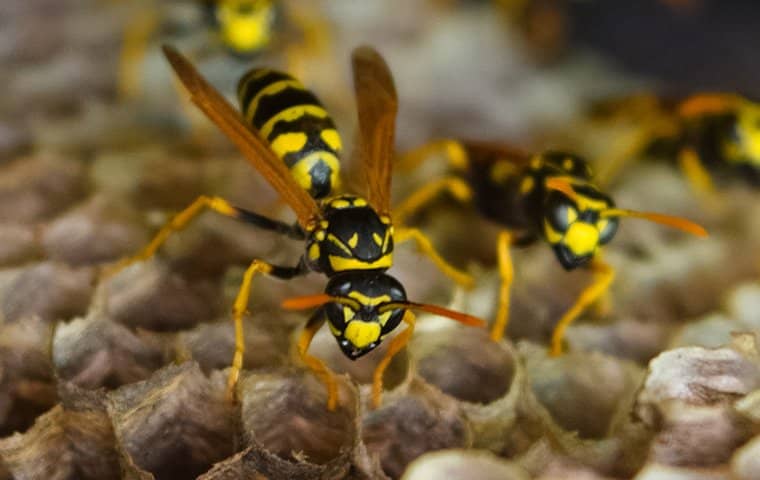
The Buzzing Menace: Effective Stinging Insect Prevention And Control For Richmond Properties
Richmond is home to a wide variety of pests. While most pests in our area are annoying, having an insect that stings buzzing around your home is another thing altogether. There are few things as irritating as coming home and not being able to walk into your house because you have wasps crawling on your door or flying around in front of it.
Stinging insects can bring life to a standstill sometimes. Today, we hope to provide you with the information you need to prevent stinging insect problems so that you don't have to call a professional for wasp removal. If we're too late, and you're already dealing with stinging pests, remember that your Go-Forth Home Services team is here to help you find relief from stinging insects. We get rid of those pests in the hard-to-reach places. Connect with us by phone or email to schedule a service call.

Know Your Enemy: Identifying Common Stinging Insects
There are many misconceptions about stinging insects. First, it is important to distinguish which pests we are referring to today. While spiders have venom but don't sting, so we're not covering them. Mosquitoes have a pointy mouth that looks like a stinger, but they bite, not sting, so we won't be discussing mosquitoes either.
There are primarily two types of stinging insects. One kind has a potent venom; the other does not. Fire ants can sting, but they have weak venom. As long as you don't have an allergy, their stings are only an annoying burn. The other kind has a strong venom. In this category are bees, wasps, and hornets. It is important to note that all hornets are wasps, but not all wasps are hornets. Today, we will zero in on bees and wasps—but mostly wasps.
- Bald-faced Hornets: These wasps build paper nests in high locations, often on rooflines. They are a nuisance because they send out sentry drones to fly around outside the nest. When the drones detect danger, they release a pheromone that inspires the other drones to swarm together to defend the nest.
- Paper Wasps: These common wasps create aerial nests and nests inside structural cavities. They are super annoying when they make nests in the ceiling of a porch or deck or on a high roofline. A paper wasp nest looks like a gray egg. The primary issue with these wasps is that they are social insects and will defend their nests when threatened. Fortunately, just walking by won't present a threat to them.
- Yellow Jackets: These wasps are small stinging insects that tend to live in landscaping. They live in landscaping because they commonly establish nests in ground holes. If you have thick mulch, you can invite a yellow jacket infestation. The big concern with yellow jackets is that ground vibrations can set them off. If you mow the lawn near a yellow jacket nest, you will likely regret it.
- Mud daubers: These wasps are less common than the others on our list. They're also not social wasps, so they don't gather into swarms. But they can sting you, particularly if you accidentally sit on one. The primary problem with mud daubers is that they build mud nests on structures.
- Bees: Three kinds of bees typically cause trouble on our properties—honey bees, bumble bees, and carpenter bees. None generally are as bad as wasps. Honeybees lose their stingers, and bumble bees and carpenter bees are solitary insects.
These are the common stinging insects found in the Richmond area. Now that you know what you're up against, let's quickly look at the trouble they cause when they enter Richmond yards or attempt to come indoors.
Stinging Insect Dangers: Property Damage And Health Risks
We won't spend much time on the topic of property damage or health risks today with regard to stinging insects, but it is important to cover it quickly. As you work to prevent and control stinging insects, you need to understand the repercussions. In most cases, your reward for going after stinging insects on your own is that you get stung. It is helpful to know how to treat insect stings.
Clean the area with soapy water, apply an anti-itch cream, and use a cold compress to bring down the swelling. Watch closely for an allergic reaction, such as difficulty breathing or swelling of the face or throat. Seek emergency care quickly if you notice symptoms other than localized pain.
The other issue with stinging insects is that they can persist if your control efforts fail. In the case of wasps, you'll continually have a stinging hazard. In the case of carpenter bees, it can mean ongoing property damage. While a carpenter bee only creates a tunnel about six inches deep, they'll return each year, reuse their old tunnel, and make it longer.
Creating A Sting-Proof Yard: Effective Tips And Techniques
When wasps or bees come into your yard, they are going to look for conditions that are favorable for habitation. If you understand what they're looking for, you can take steps to make your property less interesting. These tips can also help you reduce hazards. Here's how it works:
- Stinging insects are attracted to sources of nectar. If you reduce plants with flowers, you'll reduce this important food source. One way you can do this is by addressing weeds in your lawn and landscaping.
- Certain stinging insects eat protein sources. They are drawn to yards with lots of bugs to eat. You can reduce insects by keeping lights off at night, where it isn't a security issue. You can reduce spiders by removing webs and crushing any egg sacs you find.
- Stinging insects drink water. They will like a property that has containers that capture water, or damp conditions caused by a clogged gutter. Remove containers and clean your gutters to reduce this attractant.
- Stinging insects don't just drink water; they drink sweet liquids, too. In fact, they prefer sugar water. If you have a hummingbird feeder, you'll attract stinging insects.
- An attractant that is often overlooked is wood debris. Wasps that create paper-like aerial nests acquire the materials they need from sources of decaying wood. If you have a brush pile, logs, or stumps, you can attract these pests.
- The stinging insects that get into structural voids may be deterred from doing this. The tools for this job are a caulking gun, a high-quality caulk, and expanding foam. Seal every gap and structural cavity.
- Stinging insects that eat protein aren't above getting into your trash to find a meal. In fact, the scent of a dirty receptacle can attract them to your property. Wash your trash cans down with soapy water to remove any smells. Make sure you get trash to the curb weekly, and keep your trash covered. It is also important to keep receptacles away from your exterior walls. Wasps often create aerial nests on roof lines above trash containers because the scent rises.
You have a lot of options available to you when it comes to preventing a wasp or bee problem. But what do you do when stinging insects move in and decide to make your home their home? That's when it is definitely time to contact Go-Forth Home Services for stinging insect control.
Professional Stinging Insect Control: When To Call In The Experts
Contacting a professional when you discover wasps in a hole in the ground or a cavity within your home makes sense. It also makes sense to call for professional service if you have a nest on your roofline. A pest control technician has the training to get into tough spots and apply the materials needed to arrest either wasp or bee activity. But do you know you don't have to wait until you're dealing with a stinging insect problem to contact Go-Forth Home Services for wasp control in Richmond? When you get home pest control for your home, you get proactive wasp control.
Your ongoing home pest control service comes with routine service visits. During your service visit, your technician will look for warning signs of pest activity. During this inspection, they will detect wasp nests or wasp activity. When wasps are detected, we immediately target the nests with materials and methods that are appropriate for the unique species. The result of this proactive wasp control is that you don't have to be inconvenienced by wasps buzzing around on your porch or around your trash receptacles, and you have less chance of an unwanted sting.
Most stings occur when nests are disturbed. It is okay for stinging insects to visit your property. You want them to do this. Stinging insects help with pollination. Our job is to make sure they don't get the bright idea that living in your yard would be great. Want to learn more about home pest control or wasp control in Richmond? Contact us today.
The Go-Forth Home Services service team looks forward to helping you find the right solution for your pest control issues.
Customer Reviews
-
“He spent time educating us about "pests" and provided information regarding services with GoForth.”- Joyce C.
-
“Texted me before coming. Worked with me playing musical rooms with my dogs. I'll see how things are.”- Constance E.
-
“Amazing response time, reasonable prices, great customer service. Tevin was thorough and confident in his plan to fix our horrendous fire ant problem. We have had negative experiences with prior exterminators and probably waited way too long to call Go-For”- Ashley T.
-
“- Toya B.
We have been customers for almost 7 years for a reason. Our technician is the best. He always knows exactly how to address whatever pest has decided to bother us. We have referred them to many of our neighbors. Well worth the cost not to have to worry a
” -
“Answered all my questions and I felt their pricing was very reasonable.”- Deborah J.
-
“Brian went above and beyond what was expected, and I hope I get him again as my technician for future services!”- Tam L.
-
“He was thorough with inspecting and treating our home, which I really appreciate, and he took the time to answer my many questions.”- Jasmine B.
-
“Love the detailed summary and pics of what he did and saw! And did I mention how wonderful Olivia was to get us all set up?!!”- Beechy A.


Over the years, we’ve boiled down our mission to a core set of values:
-
Give A CrapDelight others by owning your role and saying yes. Take pride in how you appear & act & every other detail of the job. Be on time, attentive, & enthusiastic. Act as if the buck stops with you on every aspect of the job.
-
Chase PerfectionChase Perfection, knowing full well we will not reach it, but along the way we will catch excellence. Have a sense of urgency; Go-Forth Time - right now might be the only time you have to get it right.
-
Dig Deeper
Be an action-oriented professional that makes decisions based on evidence rather than stories & assumptions. Stay curious. Data can speak for itself.
Understand the cause of the fire rather than rushing to extinguish it.
-
Fight For SimplicityKeep it simple & consistent. Focus on how things should be done every time.
-
Face It, Fix ItConfront challenges directly and address issues head-on. A bias for action and powerful conversations drive our progress. It’s about getting it right rather than being right.
-
Grow!Growth is our purpose. Growing as people & growing our business.